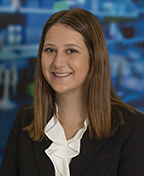
School: Washington University in St. Louis
Hometown: Scottsdale, Arizona
Mentor: Frederic Zenhausern, PhD, MBA
The blood-brain barrier (BBB) poses a significant challenge to the treatment of brain cancers by chemotherapy as it tightly regulates toxins, pathogens, and nutrients that can enter and exit the brain, preventing most of the cancer-treating drugs (> 95%) from reaching the tumors. One promising solution to overcome the BBB for drug delivery is bubble-assisted focused ultrasound (BAFUS), which has been recently demonstrated in clinics to disrupt and open the BBB so that therapeutic molecules can freely move across the barrier. To study the genetic effect on BBB disruption by BAFUS for personalized drug delivery to brain tumors, we are developing an in vitro BBB-on-chip model for BAFUS BBB disruption. The purpose of this project is to fabricate and characterize nanobubbles (NBs) to facilitate the development of the model. NBs of different recipes were fabricated according to the literature. Using an ultrasound system and a BBB-on-chip device with an ultrasound-transparent window, sub/superharmonic peaks were successfully observed, indicating the presence of the NBs due to their characteristic nonlinear cavitation. Under a static condition, we found that the diacylphosphatidyl choline DBPC nanobubble recipe yielded a half-life and signal enhancement much better than the diacylphosphatidyl choline DPPC recipe. Additionally, under a constant flow condition that better mimics the condition in vivo, the NB signal lasted the entire flow duration (~10 minutes), long enough for clinical disruption of the BBB for drug delivery (usually ~2 min). With future optimization, the NBs will critically enable our development of the in vitro BAFUS BBB-disruption-on-chip model for safe and precise drug delivery for brain cancer patients.